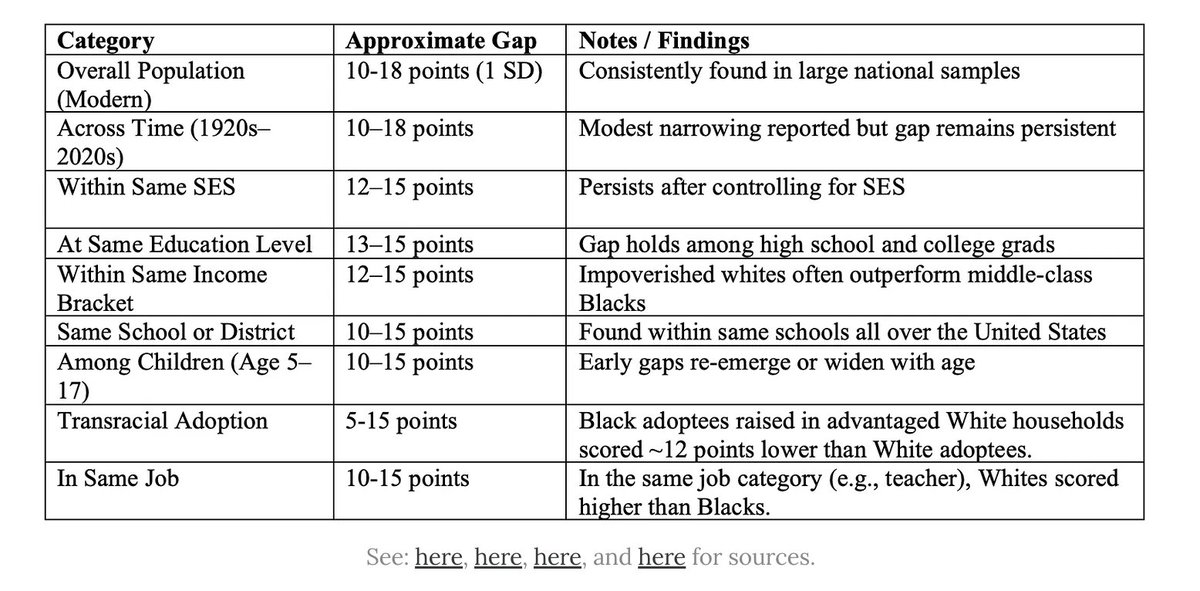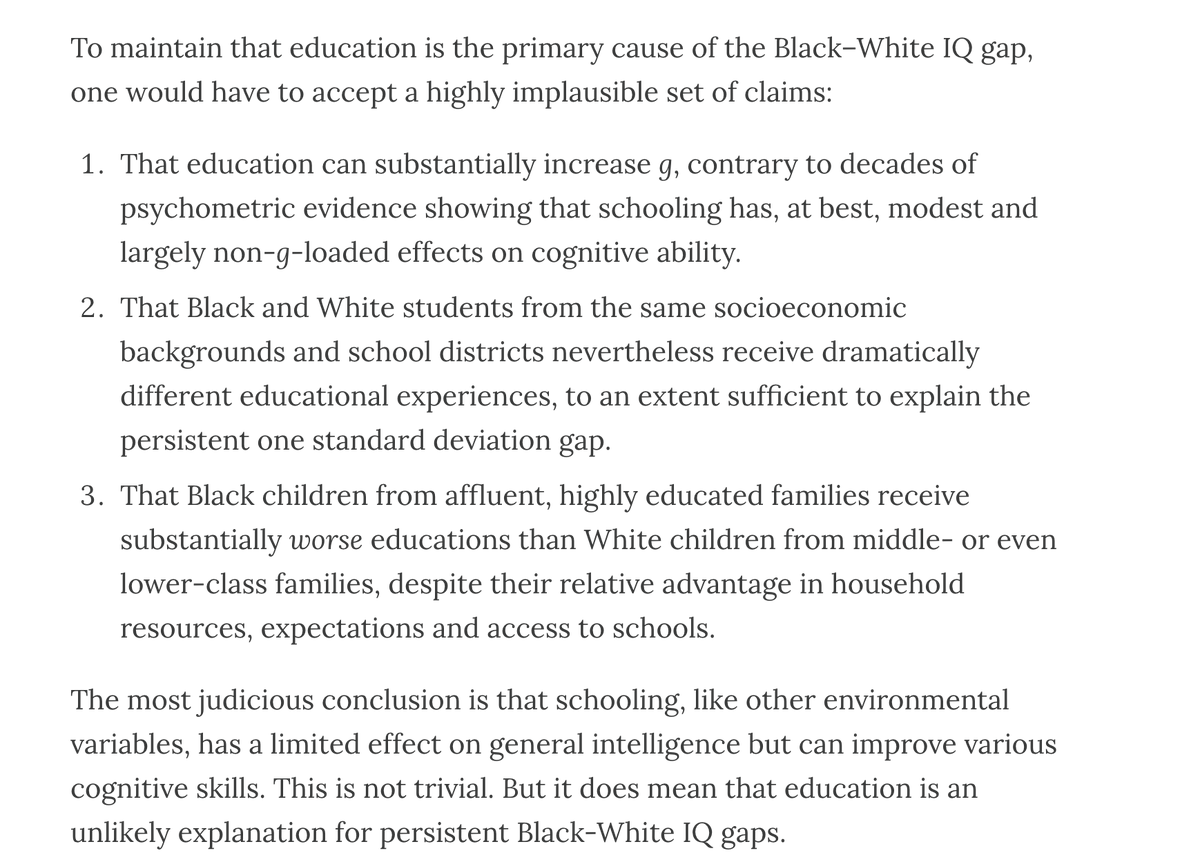(1) On average, Black Americans score substantially lower than White Americans on standardized tests of cognitive ability. This finding is well-established and largely uncontested in the academic literature.
aporiamagazine.com/p/sasha-gusev-…
aporiamagazine.com/p/sasha-gusev-…
(2) The only major question is about the cause (s) of these persistent disparities. Hereditarians argue that genetic factors play a significant role, while environment-only theorists contend that differences in physical, social, and cultural environments are the primary drivers. 

(3) More than anyone else, Arthur Jensen established modern hereditarianism. In his 1969 article, "How Much Can We Boost IQ and Scholastic Achievement?," he argued compellingly that the environment-only hypothesis was implausible and that efforts to raise intelligence had failed. 

(4) Since then, Jensen’s core arguments have found continued support. Despite the investment of billions of dollars and decades of effort, no consistent or reliable method for substantially raising general intelligence has been discovered. 

(5) The Black–White IQ gap remains nearly as large today as it was in the 1970s. It appears consistently across virtually every segment of the population, among the wealthy and the poor, the highly educated and the less educated, and across a wide range of social contexts. 

(6) To take one example, among high-SES Blacks and Whites, the IQ gap remains close to one standard deviation. Even more remarkably, Whites and Asians with poorly educated parents often outperform Blacks whose parents are highly educated. 

(7) Thus, the Black-White IQ gap is large, ubiquitous, and stubborn. This is not for lack of trying. Since the 70s, environment-only theorists have forwarded one failed hypothesis after another. 

(8) Recently, Sasha Gusev argued that "racism Twitter" was promulgating the "aggressively misleading" view that genes play some role in the large IQ gap. His arguments, however, were not impressive.
(9) His first claim was that “genetic difference between any two populations can go either direction”--which I guess is supposed to mean that Black Americans might be "genetically smarter" than White Americans. But this is incredibly implausible. 

(10) It is possible that genetic differences could go either way, but only in the way that it is possible I might beat Garry Kasparov in blitz chess or that a Golden Retriever might be genetically more aggressive than a Pit Bull, i.e., logically possible but vanishingly unlikely. 

(11) Gusev next claimed that “The mere fact that a trait is heritable within populations tells us nothing about the explanatory factors between populations.” But this is a fallacy. Within-group heritability is not dispositive; but it is often informative. 

(12) The two examples Gusev forwarded are perhaps interesting to contemplate, but they have little relevance to the Black-White IQ gap. Blacks and Whites inhabit overlapping environments. And the United States has tried desperately to boost Black performance. 

(13) Gusev then cited approvingly David Reich's self-contradictory argument from his book that expecting “genetic differences to line up with long-standing stereotypes” is tantamount to “peddling racist pseudoscience.”
(14) Notice that not only is Reich's argument weak, it is also self-contradictory. If we can't be certain about the nature of genetic differences, then we can't be certain that they will contradict contemporary stereotypes. 

(15) My best guess is that Reich included such gratuitous and weakly argued material as an attempt to preempt the ferocious attacks that reliably follow any honest discussion of race. One should regret his evasions, not cite them approvingly.
westhunt.wordpress.com/2018/04/08/liv…
westhunt.wordpress.com/2018/04/08/liv…
(16) Ultimately, Gusev seemed to embrace the view that the cause of the Black-White IQ gap is education. This is very unlikely to be correct. With only a few exceptions, Whites outperform Blacks in every school district across the country. 

(17) What is more, the IQ gap shows up early, persists across time, and is reasonably consistent *across* education levels. 

(19) Among relevant experts, there is skepticism about the importance of education for boosting general intelligence, though it can certainly boost specific cognitive skills. 

(20) Thus, the claim that education is the primary cause of the Black-White IQ gap is quite implausible and supported only by flimsy or polemical evidence. Environment-only theorists should look elsewhere. 

(21) In my view, hereditarianism is vastly more plausible than the environment-only alternative. It explains more data. It makes fruitful predictions. It is theoretically consistent with Darwinism. Unfortunately, elites seem unready for the message. 

(22) Conservatives, however, have often embraced environment-only theories, perhaps because they are afraid of transgressing sacred norms of racial egalitarianism. As noted by @nathancofnas , the intellectual justification is underwhelming.
ncofnas.com/p/thomas-sowel…
ncofnas.com/p/thomas-sowel…
(23) Better to ditch racial egalitarianism and embrace reality. Race gaps in achievement will not close anytime soon. What is needed is honesty not another decade of lies and wishful thinking. The environment-only theory has been tried. Over and over again. And it has failed.
• • •
Missing some Tweet in this thread? You can try to
force a refresh













